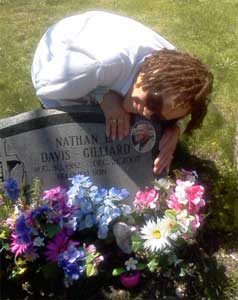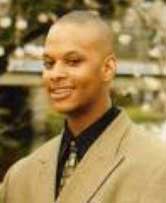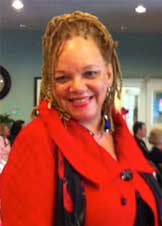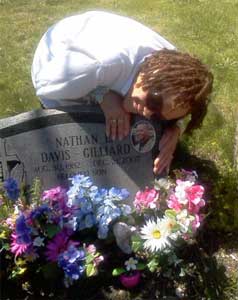 Nancy Wilson speaks to young people about resolving disputes with words, not bullets
Nancy Wilson speaks to young people about resolving disputes with words, not bullets
KINGSTON, R.I. – April 1, 2014 – After her son was gunned down, Nancy Wilson shut herself inside her house for months and cried. The images were searing: Nathan running down the sidewalk as a toddler, Nathan flashing his playful smile, Nathan catching garden snakes in the backyard. She thought about killing herself.
Family and friends tried to help, but the despair was deep, the loneliness paralyzing. She had two choices. She could give up or find a reason to live. “I heard in my head Nathan saying, ‘You can do this, Ma.’ ”
He was right. In May, she’ll receive a bachelor’s degree from the University of Rhode Island in human development and family studies, with a minor in thanatology, or grief studies. The 64-year-old East Providence resident hopes to attend graduate school and find a job teaching young people how to resolve disputes peacefully.
“I decided to make something good out of something that was so bad,” she says. “That’s my mission.”
The day never leaves her. On Dec. 21, 2007, Nathan Davis-Gilliard and two of his friends were walking in Providence’s Mount Hope neighborhood when a carload of men confronted them. Shots were fired. Moments later, Nathan, 25, was lying on Knowles Street, where he lived as a child. His body was riddled with bullets.
Wilson is reluctant to talk about the police investigation because it is still ongoing, but she says the shooting was related to a longtime feud between young men from Mount Hope and the Chad Brown housing complex, also in Providence. Suspects in Nathan’s shooting are being held in prison on other charges. Wilson is in touch with the police regularly and hopes a murder charge will be filed soon.
 Nathan, or Nate, was an altar boy, a happy kid who caught snakes in his backyard and sold them to neighbors. “Red ones for two dollars, green ones for less,” says Wilson. The middle child of six siblings, he had lots of friends. “He would be the one helping elderly people up the stairs,” says Wilson.
Nathan, or Nate, was an altar boy, a happy kid who caught snakes in his backyard and sold them to neighbors. “Red ones for two dollars, green ones for less,” says Wilson. The middle child of six siblings, he had lots of friends. “He would be the one helping elderly people up the stairs,” says Wilson.
Looking back, she says two traumatic childhood events might have scarred him. His beloved pit bull, Rock, choked to death when it tried to jump over a fence with its leash on and a boyhood friend drowned at Lincoln Woods when the two were swimming together. “I wonder if these two incidents suppressed in a young adolescent’s mind and he never learned how to cope,” Wilson says.
During his teenage years, Wilson says he got mixed up with the wrong crowd, selling drugs. He ended up at a residential facility for at-risk boys and, eventually, the Adult Correctional Institutions. Still, his mother never lost hope that he would get on the right track.
He started to turn his life around the year he was killed, she says. He was working for a moving company with his father and living in East Providence. He had a child, a little girl, and his relationship with his mom was as close as ever.
Her last conversation with him was on the morning of the murder. Wilson says they talked for hours about his girlfriend, his childhood, and even dying, asking her, “Ma, if I were to die, what would you do?” She told him to stop talking nonsense.
Wilson was at work when she got the call. Numb, she fell to her knees. “I felt empty, like a piece of me had died,” she says. She kept it together for the funeral, but fell apart weeks later. She started obsessing on numbers connected to him: his birth date, the day he died, the day he lost his first tooth, Sept. 13, 1987.
“We all react to grief in different ways and this was my way,” she says. “It was strange. I could barely function.”
Overwhelmed by sadness, she thought about going to Nathan’s gravesite, shooting herself and “letting the blood trickle down to the earth below.” Instead, she went to a psychiatrist and willed herself to continue her studies. Slowly, she moved ahead.
In 2009, she graduated from the Community College of Rhode Island with an associate’s degree in criminal justice and then transferred to URI’s Alan Shawn Feinstein campus in Providence, where she was awarded the Elizabeth W. Christopher Scholarship.
She credits her children and her “amazing” teachers and academic advisers at URI for guiding her through the tough times. “I look at URI’s staff and teachers as family,” she says. “They’ve been my backbone. They see value in my life. That’s what keeps me going.”
 Two women were especially helpful: Betty Murray and Sue Corrigan, both instructors in human development and family studies. They went beyond the academics; they talked to her privately about Nathan’s death, gently coaxing her to open up about the tragedy. “Sue held my hand,” says Wilson. “She knew something was wrong. She told me it was okay to grieve.”
Two women were especially helpful: Betty Murray and Sue Corrigan, both instructors in human development and family studies. They went beyond the academics; they talked to her privately about Nathan’s death, gently coaxing her to open up about the tragedy. “Sue held my hand,” says Wilson. “She knew something was wrong. She told me it was okay to grieve.”
Claudia Kerbel, Wilson’s academic advisor, says Wilson’s courage, persistence and compassion are valued and appreciated by not only faculty, but also students. Her accomplishments – getting a college degree at the age of 64, for one – are remarkable.
“What always impressed me about Nancy was her willingness to share her experiences with other students,” says Kerbel. “These are very deep personal feelings that she has revealed to help students with their own life experiences. She has a passion for teaching about nonviolence and the grieving process.”
Speaking out against gang violence gives Wilson purpose. She talks about her son’s death to anyone who will listen: inmates at the state Training Center, a juvenile detention center; school groups; teenagers. Not long ago, she spoke at a nonviolence march in downtown Providence, urging listeners to toss their weapons into a casket on display. Two guns and one knife hit the bottom.
“I no longer have any fear in my life,” she says. “People say to me, ‘You’re going to a crack house to talk to kids?’ What’s the worse thing that can happen to me? I’ve already had the worst thing happen, and that’s losing a child.”
This spring, as part of her URI program, she’s doing an internship at an elderly complex in San Diego, Calif., helping residents with daily activities and deal with the loss of loved ones. After graduation, she hopes to pursue her master’s degree in social work at URI and maybe get her doctorate. “I’m going all the way,” she says. “I have to.”
The family no longer celebrates Christmas since Nathan’s death was so close to the holiday, but they have a party on his birthday, Aug. 30, 1982. Family and friends bring a cake to his gravestone at North Burial Ground in Providence. Wilson says she goes there often and that she’s rarely alone. She sees other mothers whose sons have also been murdered on Providence’s streets.
“We know each other because we’re in a club none of us wants to be a member of,” says Wilson. “One day I was out there at Nathan’s grave and I remember I was grieving quite loudly and a woman came over and said, ‘Just let it out. Just let it out.’ Then she told me about her son.”
Photos above: Nancy Wilson, 64, of East Providence, and her son, Nathan Davis-Gilliard. Wilson is graduating in May with a degree in human development and family studies. Two of her daughters also graduated from URI: Amber Davis-Gilliard ’12 and Jasmine Davis-Gilliard ’11. Photos courtesy of Nancy Wilson.

